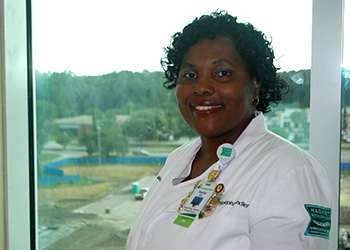
Spotlight on Martha Weston, clinical nurse educator at St. Joseph's Hospital
Martha Weston, BSN, RN, ONC
Clinical Nurse Educator, St. Joseph’s Hospital
Education: Bachelor of Science in Nursing from Armstrong State University; certified in orthopedics

SJ/C: Why did you become a nurse?
Martha: I became a nurse because ever since I was young, about 8-years-old, I knew I wanted to take care of others. I have always cared about other people, and I just knew at that time that I wanted to be a nurse.
SJ/C: What do you love about being a nurse here at St. Joseph’s/Candler?
Martha: What I love is the patient interaction you have. You develop relationships. Although it may be short, it’s the impact you can have on a patient’s life. I also love the teamwork with your peers. This is a great team. I’ve been here 25 years as of June 6 so there are some people I have seen all these years. It’s like a family.
What I also love about being a nurse at St. Joseph’s/Candler is that you have the innovation so that you don’t have to stay in one area. They promote education and there’s always learning opportunities. If you don’t want to work in one set department as a nurse, upper management helps you get to where you want to go. You are able to make a five-year plan and they make sure you can master that plan. I think that’s a good part about a Magnet facility as well.
SJ/C: What exactly does a Clinical Nurse Educator do?
Martha: The role of the Clinical Nurse Educator is to mentor. You are a mentor for your peers. You also have to be that clinical expert so that you can impact care giving to a patient. You have to be the clinical expert to empower the staff and adhere to the high standards. If a policy changes or the standard of care changes, we have to make sure we educate the staff, which in turn impacts patient care.
SJ/C: What’s an average day like for a Clinical Nurse Educator?
Martha: The average day for me is I come in and check my email, and then I go check each unit. I have conversations with nurses to find out if there are any barriers to them providing care to the patients. If they share anything with me, that’s my opportunity to provide some form of education or to even be a liaison with upper management. I do my rounds. I speak with the staff. I have some interactions with the patients, and attend any meetings necessary.
SJ/C: You’ve been a nurse for 25 years. Do you recall a moment where you thought, ‘This is why I became a nurse?’
Martha: I had a moment, well several, but this moment I remember the fear and anxiety that one of my adolescent patients was going through post-surgery. I was able to be a listening ear and provide support by not only giving instructions but also allowing time for her to think about it and accept it and work through it. It was wonderful to see the fear transform into empowerment for her to get up and move. She kept thinking, ‘I’m in a lot of pain. I can’t move.’ You just talk them through it. Moving the child from that state of fear to giving them the knowledge to empower themselves to bring about change is a good feeling.
SJ/C: What does it mean to you to be a Magnet nurse?
Martha: Magnet nurse to me means utilizing the highest quality of standards to provide high-quality care. Evidence-based practice is implemented in what we do, what I do.
SJ/C: What is the most often-asked question you are asked as a nurse?
Martha: The most often-asked question you are asked is ‘Do you like being a nurse?’ That’s the most often-asked question, ‘Do you like what you do?’ My answer is always, ‘Yes. I love what I do.’
SJ/C: What advice would you give to new nurses or those considering a career in nursing?
Martha: The advice I would offer them is to set a goal and have a working plan. It’s not going to be a walk in the park but if it’s worth the sacrifice it’s worth obtaining.
Achievements: Member of Professional Nursing Council and Unit Council and member of American Nurses Association and Georgia Nurses Association
Family: Married and mother of three
Hobbies/Interests: Reading and listening to any type of music
